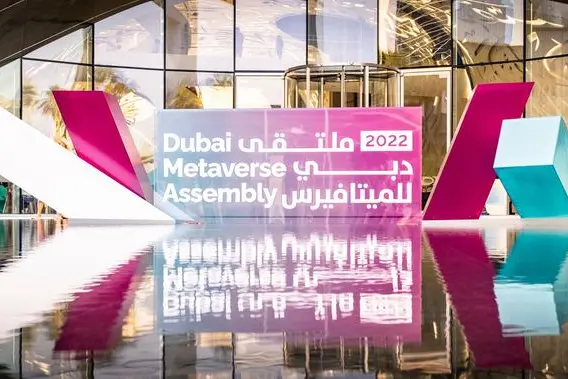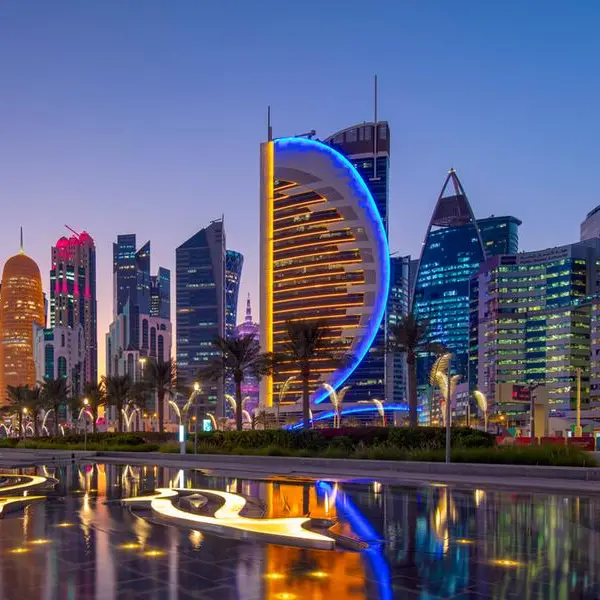PHOTO
DUBAI: Dubai Metaverse Assembly, which kicked off today, saw 500 delegates, including government ministers, business leaders, global corporations, key decisionmakers and the metaverse community, share insights on the metaverse and how to unlock its potential.
Participants included Abdullah bin Touq Al Marri, Minister of Economy; Omar bin Sultan Al Olama, Minister of State for Artificial Intelligence, Digital Economy, and Teleworking Applications; Sultan Ahmed Bin Sulayem, Chairman and CEO of DP World; Khalfan Belhoul, CEO of Dubai Future Foundation (DFF), as well as leaders from World Economic Forum, Microsoft, Meta, Accenture, PwC, and Binance, Majid Al Futtaim, DAMAC, Digital Dubai, among others.
Bin Touq announced the launch of the Ministry of Economy’s metaverse office during the first panel session, in line with the UAE’s vision to become a global leader in the digital economy.
"The UAE has the potential to become one of the world’s top 10 metaverse economies and a global center for the metaverse community," he said. "We are setting up a third office – this time in the metaverse – to complement our physical locations in Abu Dhabi and Dubai. The metaverse is a new economic equaliser and under the vision of our leaders, we will continue to pave the way for a new era of opportunities that accelerate our knowledge-driven economy," he added.
Al Olama revealed for the first time that five pillars will underpin the new Dubai Metaverse Strategy – tourism, real estate, education, retail and government services.
"Dubai is serious about discovering the potential of the metaverse and sowing the seeds to ensure we reap the economic rewards in the future," he said. "Our population in the metaverse is already the same size as those in India and China, despite our smaller geographic size. This shows that we continue to punch above our weight as a nation. And as we aim to become a top 10 metaverse economy, we will create a digital twin of Dubai to simulate our plans for tourism, real estate, education, retail and government services in the virtual world."
For his part, Bin Sulayem took part in a fireside chat on the importance of building a backbone for web 3.0 technologies that will allow people and trade to flow seamlessly across the virtual world.
"We are exploring how to deploy the metaverse across our services, including simulations of warehousing and terminal operations, container and vessel repair inspections, safety training, and other commercial uses," he said. "Our customers will now be able to see and understand the whole supply chain from end to end with full visibility and take corrective action in case of logistics bottlenecks. We hope that using this technology, we will be able to keep trade flowing, increase visibility and minimise disruption to build trade networks fit for the future," said Bin Sulayem.
Khalfan Belhoul, CEO of DFF, delivered the opening address at the forum. He said, "Technology has become ubiquitous, revolutionising our daily lives and playing an existential part in vital sectors including education, finance, energy and even healthcare. By applying new technologies and tools, we can see improvement in living standards. The metaverse will likely infiltrate every sector in some way in the coming years, with the market opportunity estimated at over US$1 trillion in annual revenues. Under the UAE’s leadership, Dubai can become as a testbed to build a network of technology leaders and create collaborations to build a metaverse ecosystem that will allow us to seamlessly connect between real and virtual worlds."
Ihab Foudeh, Public Sector General Manager, Middle East and Africa at Microsoft, delivered a keynote speech on the future of the metaverse. He highlighted new opportunities for governments, corporates, and societies, and addressed why investors are placing big bets on the metaverse.
Foudeh’s speech was followed a discussion on real estate in the virtual world. The panel included: Joe Abi Akel, Chief Corporate Development Officer, Majid Al Futtaim Group; Ali Sajwani, General Manager, Damac Properties; Guy Parsonage, Partner and Experience Consulting Lead, PwC; and Samuel Hamilton Creative Director, Decentraland Foundation. It explored the virtual real estate sector, the opportunities to engage new customers and the types of activity we can expect to see.
Another panel on how to maximise the metaverse’s potential examined its various building blocks, including decentralised technologies, platforms, and applications included: Cathy Li, Head of Media, Entertainment and Sport Platform, Member of the Executive Committee, World Economic Forum; Dr. Marwan Al Zarouni, Founder, Strategic Advisor, Dubai Digital; and James Hairston, Director of Reality Labs Policy, Meta, Balsam Danhach, Chief Executive Officer, FTX MENA.
Asma Shabab, Senior Director of Innovation Advisory at Accenture, and Ann Griblin, Director of Accenture Labs, emphasised the importance of enhancing trust and neutralising concerns over privacy, bias, fairness and human influence. They also spoke about how to manage the blurring line between the physical and digital lives of people.
Jaid Meskel from Magic Leap Company presented a session on metaverse applications and the role of augmented reality in developing vital sectors and successfully applying new and innovative practices to advance healthcare, manufacturing and automotives.
Accenture, the World Economic Forum, Meta, The Economist, Asiarath and Outlier Ventures held closed side-sessions during the first day of the Assembly, in addition to nine immersive experiencers for delegates to explore the metaverse.
WAM/Amjad Saleh




















